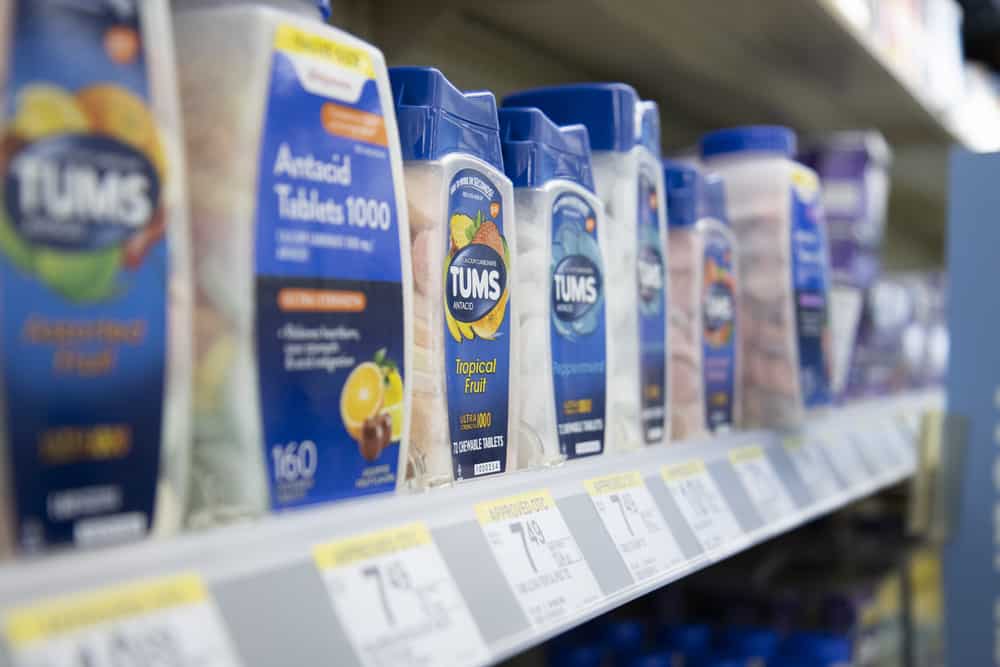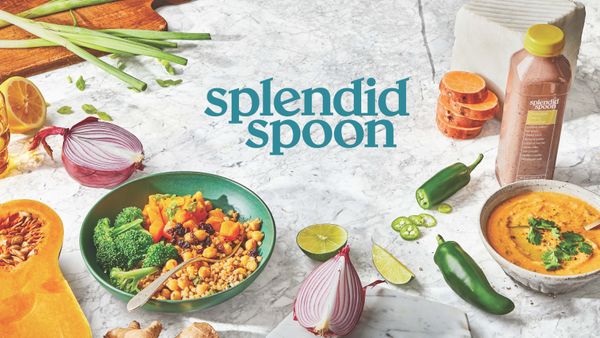You see them on the shelves of most retail stores, but when you have a bit of heartburn or an upset stomach, can you consume them as a vegan? The short answer is yes. But, there is more than one flavor to consider, and calcium carbonate could be a concern.
So, we are going to take a closer look to get to the bottom of all the ingredients.
Ingredients
A combination of sucrose (table sugar), calcium carbonate, mineral oils, organic acids, natural and artificial flavors, and food colorants (that are vegan friendly) make up the ingredients list for Tums.
Calcium carbonate is the active ingredient used in Tums, but is it problematic? It works fast to neutralize the acidity in the stomach that can cause heartburn and an upset stomach. It is found on rocks with high levels of the compound including limestone, but also chalk, travertine, and marble. There are other sources, which could make a product containing calcium carbonate unsuitable for a vegan. These include oyster shells, eggshells, and even snail shells which would make Tums non-vegan.
Still, calcium carbonate is not as frowned upon in the same way that other potentially non-plant-derived ingredients are. Most companies tend to use natural sources.
If you are looking to the likes of PETA who regularly updates a list of animal-derived ingredients, you won’t find calcium carbonate on there.
The calcium carbonate used in Tums is processed from pure limestone to give it a high purity. Thankfully, this makes it vegan.
The regular version of Tums is available in a variety of flavors with different ingredients, here are some of the vegan-friendly options:
Tums Regular Strength
Tums Regular Strength is the most common and popular Tums. They are the go-to option for anyone who is feeling the pain from high acidity.
Available in assorted fruit flavors as well as peppermint, the ingredients list reads as follows:
With the active calcium carbonate, other inactive ingredients in the assorted fruit version include the following:
Inactive Ingredients:
Adipic acid, corn starch, FD&C blue #1 lake, FD&C red #40 lake, FD&C yellow #5 (tartrazine) lake, FD&C yellow #6 lake, flavors, mineral oil, sodium polyphosphate, sucrose, talc
The Peppermint version includes calcium carbonate as well as:
Corn starch, flavor, mineral oil, sodium polyphosphate, sucrose, talc
So, there is nothing that should concern anyone following a plant-based diet for this version.
Tums Sugar-Free
Tums Sugar-Free are almost identical to regular strength (except for sugar). The Melon Berry version does contain one ingredient that will raise a few eyebrows for a vegan:
acacia gum, calcium stearate, FD&C red #40 alum lake. FD&C yellow #5 alum lake (tartrazine), flavors, sorbitol, sucralose
Stearate or static acid comes from triglycerides and can be derived from either plant-based or animal sources. It’s not the most controversial ingredient and a lot of people will keep reading the ingredients list without a second glance. It is a major component of cocoa butter and shea butter, but it can be difficult to identify where exactly a brand sources theirs from.
Anyone looking to be particularly cautious will avoid this ingredient, but for the most part, it can be acceptable.
Tums Smoothies
Tums Smoothies come in the flavors already used in the previous two varieties, including peppermint, assorted fruit, and merry berry.
Expect starch sources across each of their ingredient profiles such as cornstarch and dextrose, vegetable gums like guar and microcrystalline cellulose, stearate, sucrose, and sorbitol.
Again, the inclusion of stearate could put some vegans off, but otherwise, these are fine for a vegan to consume.
FAQ
Is There Any Dairy In Tums?
In the versions we have scrutinized, there is no dairy to be found. However, there is one type of Tums that does, and that is their Chewy Delights range.
There are three flavors available, Very Cherry, Orange Rush, and Smooth Peppermint. Each contains a slightly different version of the following (Very Cherry):
Corn starch, corn syrup, corn syrup solids, FD&C red #40 lake, flavors, glycerin, hydrogenated coconut oil, non-fat dairy milk, propylene glycol, soy lecithin, sucrose
One thing they all use is non-fat milk. Due to the negative treatment of dairy cows, this makes them non-vegan. Cows are often taken away from their one-day-old calves, and the stress of dairy farming can cause disease, and problematic reproductive system that renders the cows worthless, so they are slaughtered.
Other Non-Vegan Tums
A combination of beeswax, carmine, and shellac find their way into the following Tums:
- Tums Chewy Delights Gas Relief, Lemon and Strawberry, – Beeswax, Shellac, Carmine
- Tums Chewy Bites Cooling Sensation – Beeswax, Shellac
- Tums Chewy Bites, Assorted Berry – Beeswax, Shellac, Carmine
Beeswax is an animal-derived ingredient, so most vegans will avoid it, although some will still consume it as part of a plant-based diet.
Shellac is derived from the secretions of lac bugs as they consume and secrete tree sap. Shellac is scraped from the bark, but this process can involve the scraping of dead lac bugs. Insect derived is still an issue for many vegans.
Carmine is an artificial food dye that is made from crushed bugs. That’s right the cochineal beetle is used for its red pigment and is often used in cosmetics as well as food.
How They’re Made
Huge amounts of calcium carbonate and sugar are combined with starch and water before a compressor forces the mix into tablets at the St. Louis plant of GlaxoSmithKline,
Then, an air conveyor system of bottles passes and they are filled with chalky tablets.
Final Word
Whilst not every Tums is going to be suitable for a plant-based diet, there are options for getting rid of heartburn when acidity causes discomfort.
Stay clear of the animal-derived versions and stick to the regular strength, sugar-free, and smoothies varieties.



